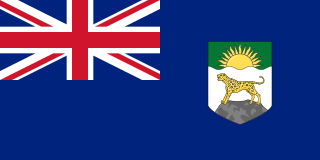Related Research Articles

Politics of Malawi takes place in a framework of a presidential representative democratic republic, whereby the President of Malawi is both head of state and head of government, and of a multi-party system. Executive power is exercised by the government. Legislative power is vested in both the government and the National Assembly. There is a cabinet of Malawi that is appointed by the President of Malawi. The judiciary is independent of the executive and the legislature. The government of Malawi has been a multi-party democracy since 1994. The Economist Intelligence Unit rated Malawi a "hybrid regime" in 2019.
A governor is an administrative leader and head of a polity or political region, ranking under the head of state and in some cases, such as governors-general, as the head of state's official representative. Depending on the type of political region or polity, a governor may be either appointed or elected, and the governor's powers can vary significantly, depending on the public laws in place locally. The adjective pertaining to a governor is gubernatorial, from the Latin root gubernare.

Nyasaland was a British protectorate located in Africa that was established in 1907 when the former British Central Africa Protectorate changed its name. Between 1953 and 1963, Nyasaland was part of the Federation of Rhodesia and Nyasaland. After the Federation was dissolved, Nyasaland became independent from Britain on 6 July 1964 and was renamed Malawi.
A commissioner is, in principle, a member of a commission or an individual who has been given a commission.

The Cape Winelands District Municipality, formerly the Boland District Municipality, is a district municipality located in the Boland region of the Western Cape province of South Africa. As of 2011, it had a population of 787,490. The largest towns in the municipality are Paarl, Worcester, Stellenbosch and Wellington.

The New South Wales Rural Fire Service is a volunteer-based firefighting agency and statutory body of the Government of New South Wales.

The National Assembly is the legislative body of Botswana's national government. With the President, the National Assembly forms Botswana's unicameral Parliament. It is advised by the Ntlo ya Dikgosi: a council of chiefs which is not a house of Parliament.
The Government of Karnataka, abbreviated as, GoK, or simply Karnataka Government, is a democratically-elected state body with the governor as the ceremonial head to govern the Southwest Indian state of Karnataka. The governor who is appointed for five years appoints the chief minister and on the advice of the chief minister appoints his council of ministers. Even though the governor remains the ceremonial head of the state, the day-to-day running of the government is taken care of by the chief minister and his council of ministers in whom a great amount of legislative powers are vested.

Nepal Red Cross Society is an independent, volunteer-based and nonprofit-humanitarian organization that delivers humanitarian service and support to the vulnerable people in an impartial and neutral manner. It came into being on 4 September 1963. Nepal Red Cross Society was officially registered in Nepal after Nepal Government acceded to the Geneva Conventions. Having been recognized by the International Committee of the Red Cross (ICRC) and affiliated to International Federation of Red Cross and Red Crescent Societies (IFRC) on 1 October 1964.
The Government of the Commonwealth of Pennsylvania is the governmental structure of the Commonwealth of Pennsylvania as established by the Pennsylvania Constitution. It is composed of three branches: executive, legislative and judicial. The capital of the Commonwealth is Harrisburg.
In Malawi a system of Traditional Courts has been used for much of the twentieth century to mediate civil disputes and to prosecute crimes, although for much of the colonial period, their criminal jurisdiction was limited. From 1970, Regional Traditional Courts were created and given jurisdiction over virtually all criminal trials involving Africans of Malawian descent, and any appeals were directed to a National Traditional Court of Appeal rather than the Malawi High Court and from there to the Supreme Court of Appeal, as had been the case with the Local Courts before 1970.
The Government of Karachi is the administrative body for the city of Karachi, Pakistan. Presently the Karachi Local Government system consists mainly of the Karachi Metropolitan Corporation, headed by the Mayor or Administrator.

There are 8 divisions and 64 districts in Bangladesh, each district further subdivided into upazila. The area within each subdistrict, except for those in metropolitan areas, is divided into several unions, with each union consisting of multiple villages. Direct elections are held for each union, electing a chairperson and a number of members. In 1997, a parliamentary act was passed to reserve three seats in every union for female candidates. Following elections in the 2014–16 period, 25.2% of councillors were women, up from 23.4% in the 2011–13 period.
District Coordination Officer was the administrative head of the newly formed district and city district governments in Pakistan and a senior officer (BS20/21) belonging from the Provincial or Federal government service (PAS) cadre. He supervised the affairs of all the public offices and public facilities in the district or a city district for purposes of integrated development, efficient use of public resources and effective service delivery. He ensures that the standards set by the Government in respect of a public facility are fully observed and supervises and coordinates the implementation of the policies, instructions and guidelines of the government.

Michael Regan is an American politician and former U.S. Marshal. A Republican, he is the Pennsylvania State Senator from the 31st district. Prior to that, he served as a member of the Pennsylvania House of Representatives, representing the 92nd district from 2013 to 2016.

The Georgia Department of Community Supervision (DCS) is an executive branch agency of the U.S. state of Georgia. DCS is headquartered in the James H "Sloppy" Floyd Veterans Memorial Building with additional field offices throughout the state. DCS is tasked with: the supervision and reentry services of felony probationers and parolees; the oversight of adult misdemeanor probation providers; and, provides administrative support to the Georgia Commission on Family Violence (GCFV).

District administration makes up the third level of government division in Nepal. The provision for a District Assembly, which acts as the legislature at the district-level, is mentioned in Part 17 of the Constitution of Nepal. The 77 districts of Nepal each have their own district assemblies which in turn elect their own District Coordination Committees, which serves as the executive at the district-level. In addition to this each district also has a District Administration Office which oversees the general administration of each district.
Since 1933, various traditional chiefs in Nyasaland have been designated as Native Authorities, initially by the colonial administration, and they numbered 105 in 1949.. They represented a form of the Indirect rule which had become popular in British African dependencies in the second quarter of the 20th century, although Nyasaland's Native Authorities had fewer powers and smaller incomes than similar institutions in other African colonies. The Native Authority system worked reasonably effectively until after the Second World War, when they were obliged to enforce unpopular government agricultural policies and, in some cases, their support for the Federation of Rhodesia and Nyasaland made Native Authorities unpopular with many of their people. After 1953, many of the powers of individual chiefs were transferred to councils which became the Native Authorities, although the chiefs sat on these councils. After independence, the authorities were renamed Traditional Authorities and continued to operate, and the status and influence of many of the chiefs revived through their cooperation with the Malawi government of Hastings Banda.
Deputy Commissioner or District Magistrate is a chief administrative, land revenue officer/collector and representative of government in district or an administrative sub-unit of a Division in Pakistan He belongs to the commission of Pakistan Administrative Service (PAS) erstwhile DMG/CSP or the Provincial Management Service (PMS) erstwhile Provincial Civil Service PCS. The PMS officers serve in there respective provinces only whereas PAS officers are posted throughout Pakistan. Deputy commissioners perform their duties under the supervision of a divisional commissioner and commissioners have generally a ceremonial role.
References
- ↑ "Malawi" . Retrieved 2016-08-16.
- ↑ https://docs.google.com/viewer?a=v&q=cache:YH_U-TVECtEJ:training.fema.gov/EMIWeb/edu/Comparative%2520EM%2520Book%2520-%2520Chapter%2520-%2520Emergency%2520Management%2520In%2520Malawi.doc+What+is+a+district+commissioner+Malawi&hl=en&gl=us&pid=bl&srcid=ADGEESh6a2WvKuJ0QazfE3RLVf_hvaP3vgTetHDUkN7ThDh5q4E-jduqaMOHhCoVLUzNEHFFMuZjybVEozp9TgdeOT6Yh3Mb6dmlVA3jr2ZNZFKuFZhsy33fb8gxPzx9Jsoyu-30AfRc&sig=AHIEtbRzpc1z19lvRdz8hWpNnPiYKvtb6w [ bare URL ]
- ↑ Chiweza, Asiyati Lorraine (2005). "Women's Inheritance Rights in Malawi: The Role of District Assemblies". Development in Practice. 15 (1): 83–89. doi:10.1080/0961452052000321622. JSTOR 4030169. S2CID 218524820.
- ↑ MALAWI, FACE OF (29 July 2011). "LOCAL GOVERNMENT DECENTRALIZATION IN MALAWI, KEY TO RURAL DEVELOPMENT | Face Of Malawi". www.faceofmalawi.com. Retrieved 2016-08-16.
- ↑ "Uncdf - Local Development Funds: An Internal Review". Archived from the original on 2011-09-27. Retrieved 2011-08-10.
- ↑ "Neopatrimonial Politics, Decentralisation and Local Government: Uganda and Malawi in 2006" . Retrieved 2016-08-16.